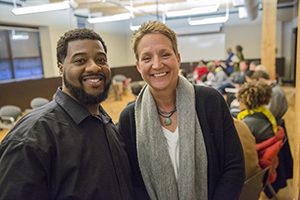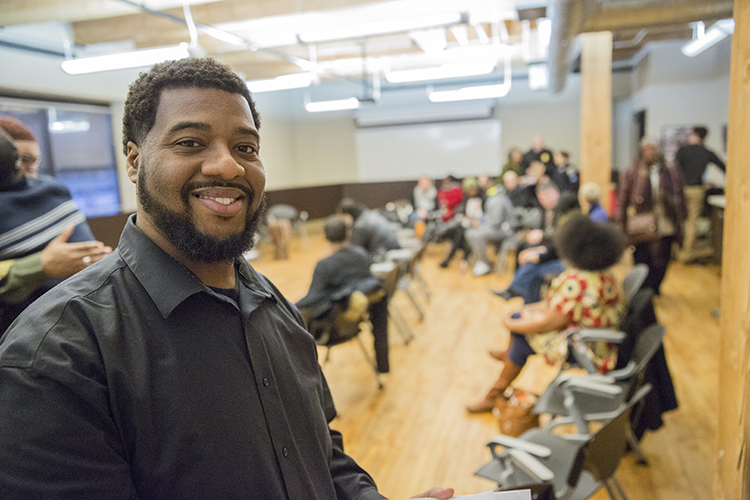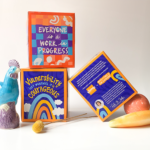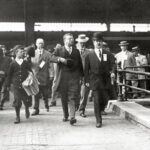For UWM doctoral student Kitonga Alexander, community is not just a place where you live. It encompasses something more – service.
Alexander’s sense of community began in the classroom. As an elementary student in Milwaukee’s Harambee Community School, his father served as president of the school board while working for UWM. Harambee and UWM had a decades-long relationship that had a lasting impact on Alexander; he has since earned a bachelor’s degree and an MBA at UWM leading up to his current work toward his PhD in Africology.
While education has helped him achieve a richer understanding of community, his experience as a student is only one piece of the puzzle.
He took to the other side of the desk as a schoolteacher for 12 years at Harambee and Clara Mohammed School. It was through educating youth in the Milwaukee community that he realized the need to reach a broader base of individuals to effect change.
“I was able to see the children and I was able to see the amazement the children had, but I was also able to connect with the trauma that a lot of children have,” Alexander said. “I realized that in order to help the children, in my opinion, I needed to be able to reach the parents and the people who influence the children.”

His heightened sense of service led him to form United for Progress and Productivity, a community-focused grassroots organization. Through UPP, he formed a connection with the Alma Center, a group that works to reduce violence in the Milwaukee community. Alexander coordinates a program at The Alma Center called the Welcome Home Project, which includes his initiative the Walk of Truth.
“He brings his full brilliance, heart and soul to his work,” said Terri Strodthoff, founder and executive director of the Alma Center. “He is a tremendous asset to the Alma Center and to the Milwaukee community.”
The Welcome Home Project is a collaboration among the Milwaukee community, law enforcement and service agencies designed to address violence and crime. The project works with people returning from incarceration, giving them a second chance to succeed in the community.
“We have individuals (in the community) who return from incarceration who may not have the support to be productive in the community, which could influence or lead them back into the cycle of violence,” said Alexander. “What we do is grab individuals and try to support them with a holistic approach.”
The Welcome Home Project offers social support, in addition to support for needs such as employment and housing, to minimize sources of trauma in their lives.
That path of progress includes a few primary stages such as notification and intake, but the Walk of Truth stage is where Alexander’s service comes into full swing.
“The Walk of Truth is really the guts and glory of the whole project,” Alexander said. “It’s a pro-social intervention designed to take each individual on a journey toward productivity.”
The Walk of Truth includes four sections, each with a distinct theme: history, purpose, creativity and faith. Each section highlights a different challenge or approach to productivity.
“It shows them the blueprint for how they could participate in the productivity of the community,” Alexander said. “We tell individuals what they should or shouldn’t do, but we don’t tell them why they should or shouldn’t do it.”
Alexander received the inaugural Inspiring Teacher award at WTMJ’s Positively Milwaukee Awards for his work with The Walk of Truth.
While his experiences as a student and educator have helped foster his sense of community through service, his family also motivates him to create a community reminiscent of the one that he found crucial to his own upbringing.
“I wanted to see for my family an environment similar to (mine) at Harambee,” he said. “With that sense of community, it led me to start realizing a lot of the problems that we have in the city.”
Alexander wants his children to have the best possible chance for productivity and happiness in the city, but also finds joy and appreciation in offering service to people. He believes that people who are unhappy, or in pain, are less capable of leading a fruitful life. That belief motivates him to support and address the pain of those in the community, and respect the individuality of each person’s path.
“He’s grateful for every experience. He always finds the good in every situation,” said Javon Alexander, co-founder of United for Progress and Productivity and Kitonga’s wife. “He exemplifies what it means to put others before yourself. I admire that about him.”
Variety, as Kitonga Alexander calls it, is a crucial element of community.
“Sometimes I feel like we get stuck thinking that everyone has to do the same thing, but if everyone was the same you wouldn’t have community,” he said. “Even if you had all doctors, who would pick up the garbage, right?”
Alexander believes that ego, something everyone can be susceptible to, can distort the bigger picture of community. It is important yet difficult, he said, to support people when their journeys look different than our own.
“I see individuals from all different walks of life,” Alexander said, “but the purpose is for everyone to be productive in their own way. That looks totally different depending on the histories and cultures of different individuals.”







